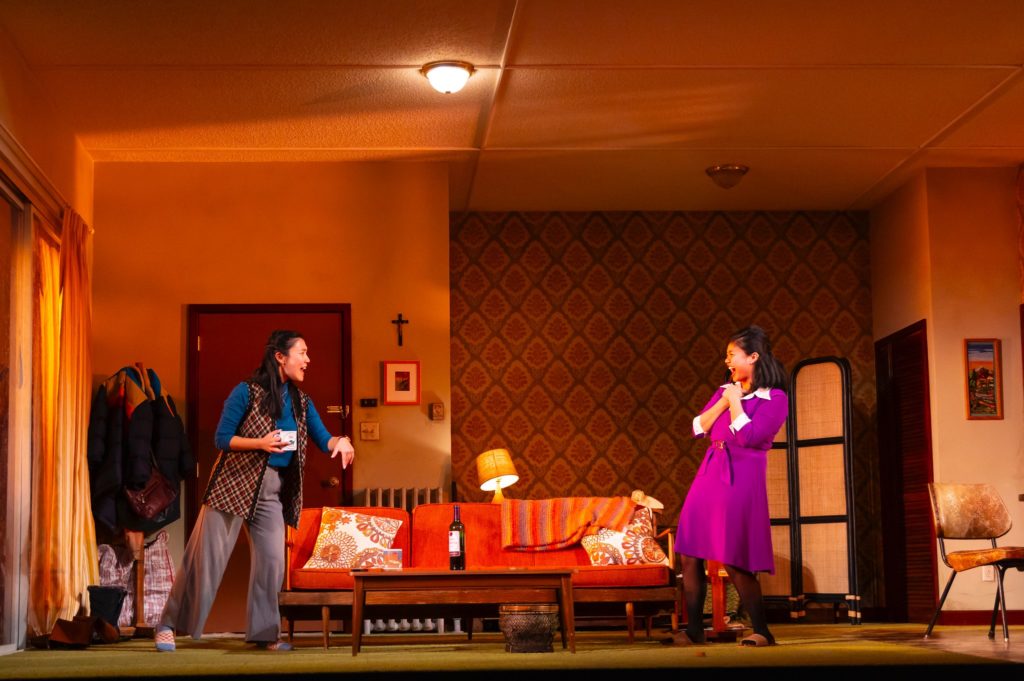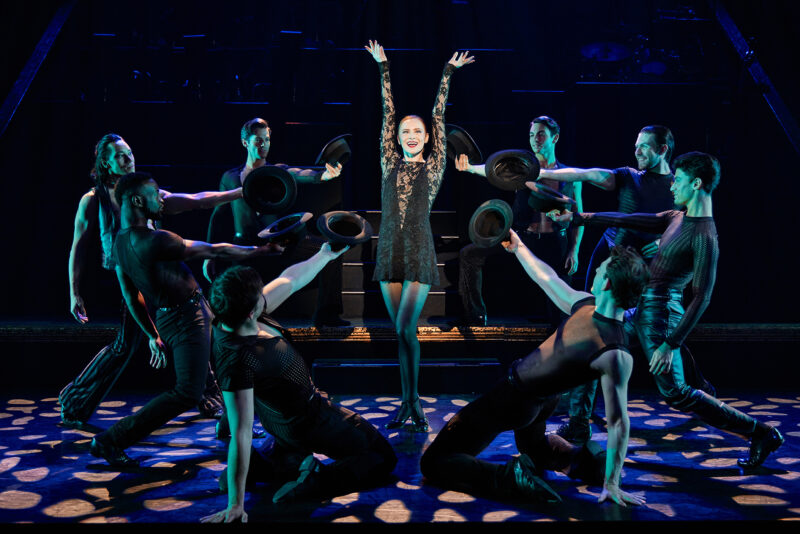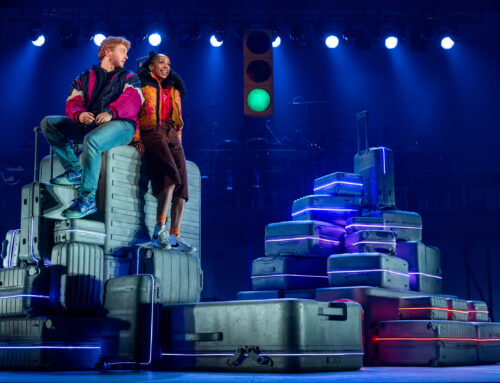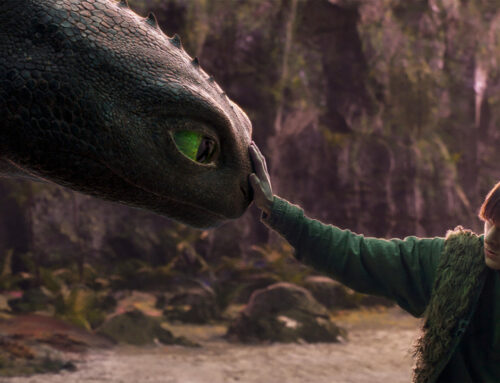This is a BUSY time for theater and award-worthy movie releases –and I’ve seen a lot lately. Here’s a roundup of my take on some of the latest!
MUST SEE: The New England premiere of THE HEART SELLERS! The Huntington has done it again. This funny and moving new play by Lloyd Suh (who also wrote The Chinese Lady) and directed by May Adrales will break your heart then fill in the cracks with hope and faith. The title is a pun on anti-discrimination law, the Hart-Celler Act, which became law in 1965 and abolished immigration quotas. The title thus redirects us to the play’s deeper meaning, the ways in which immigrants not only sell their hearts and souls when they uproot themselves from their native cultures, but how they reclaim their identities in an alien world.
In The Heart Sellers, two Asian immigrants in 1973 meet in a supermarket at Thanksgiving. Their husbands are busy with medical residencies leaving these young women Luna and Jane, to make the best of this decidedly American holiday. Jenna Agbayani plays Luna, originally Luningning Ignacia Mangahas de la Rosario Bustos, a 23-year-old from the Philippines. Judy Song plays Jane, originally Hong Jae Ha, a 23-year-old from Korea who has dubbed herself “Jane” for Jane Fonda! These brilliant actresses have charisma and timing to spare. Aside from one false moment (Jane suddenly gets completely drunk and spits out a cork) they calibrate their evolving relationship with enormous control, letting down their guard, then pulling back, all the while (90 minutes) holding us transfixed.
While the play is certainly funny, it is infinitely more. At first, I had a hard time understanding their rushed, heavily-accented English as did these characters when they first started talking to each other. Gradually, we all began to hear one another, and the laughs came in fits and starts as Luna and Jane– like Lucy and Ethel– tackled cooking a frozen turkey, got increasingly crocked on wine, and dreamt about such American pastimes as Disneyland, porno, and disco dancing. Inevitably, the conversation turned to the volatile politics of their respective countries, opening up another way into their shared experience, as well as a portal to understanding the profound estrangement of feeling like a foreigner anywhere on this earth.
As the climax approaches, Suh has crafted a pair of exquisite monologues, as incandescent as poetry, which these two deliver in tandem. Luna gives voice to the sorrow and loneliness of the immigrant experience in ways I had not fully appreciated. She describes the deep rift leaving her homeland has caused, a rift between her past (the culture left behind) and her future (children who will be born American and will not fully understand their mother’s experience). Luna feels adrift in the present.
Then Jane picks up with a stunning monologue, an ode to resilience. She acknowledges that their dreams and choices have been limited having been raised to dutifully follow their husbands’ dreams. She also calls out the outsized power that men wield in the world and the war-mongering damage they do (Nixon occasionally pops through on TV in the background). But then in a moment of irrepressible triumph she declares that each of them WILL dream– Jane of painting, Luna of singing–and so much more. These final words as they sit side by side on the sofa, close together in the softening light, left me stunned and elated. Her unshakeable optimism and faith in connection, resonates like a rallying cry and a prayer. In this transcendent climax we witness two women forge their friendship in the furnace of a strange land and a world on fire. DO NOT MISS The Huntington’s production of THE HEART SELLERS at the Calderwood Pavilion through December 23!
I also saw CHICAGO onstage at The Colonial presented by Broadway in Boston. Bob Fosse’s seminal jazz age musical about murder, corruption, and tabloid fame is more relevant than ever in a cynical era where social media fuels overnight celebrity, and AI bots lubricate our lust for sensation. Surfaces can’t be trusted, systems are corrupt, discord flourishes, and common sense and common decency are in shorter supply than guns toted by the criminally insane. Kander and Ebb’s lyrics say it all: “Nobody’s got no class.” Unfortunately, also in short supply are “triple threats”–individual performers who can sing, dance, and act in equal measure. Almost everyone in the cast can dance. Almost no one can sing. The acting is sketchy at best. CHICAGO surely deserved better in Boston and everywhere it goes on this its 25th Anniversary Tour. At The Emerson Colonial Theatre Through December 3rd.
BUT give yourself a present this season and SEE one of the best movies of the year: THE HOLDOVERS. Paul Giamatti stars as an ornery teacher at a fictional boys school in New England, Barton Academy, who is cornered into babysitting “the holdovers.” These are the students who have been abandoned by their wealthy, pre-occupied families and otherwise have no place to go over Christmas break. Professor Hunham is defiantly exacting in his dealings with one particular troubled student, Angus Tully played by Dominic Sessa in a breakout, multi-layered performance. Professor Hunham gradually comes to see the two have more in common than is at first apparent.
David Hemingson’s funny, wise screenplay is a masterpiece of subtlety and honesty. There’s only a whiff of the curmudgeon with a heart of gold about it. Giamatti also sees to that. His absurd irascibility is as endearing as it is funny. In fact, most of the time, both teacher and student are equally off-putting, to hilarious effect. Then, very gradually, and with wondrous serendipity, the ice starts to thaw between them as difficult truths are revealed about their mutually complicated family histories and emotional scars.
One more character finds herself holed up with this difficult duo: the head cook Mary Lamb played with unflinching cool by Da’ Vine Joy Randolph. Her character provides no-nonsense sustenance in the form of regular meals, and the grit with which she bears the loss of her only son in Viet Nam. Her unflinching stamina and warmth undergirds this makeshift family triangle. Unexpected joy and humor soften the edges between the boy and the man as she helps propel them through their lonely Christmas sojourn.
The film nails the look and feel of a gray winter in and around Boston, 1970. So fun to recognize the landmarks–even if they are discontinuous– as these two make their way through the slushy streets, their bond filling the cracks in the holiday “cheer.” But Director Alexander Payne never plays for sentiment, never makes a false move. He sticks close to the reality of his characters’ inner and outer lives, and tempers his observations with a deeply humane sensibility and a healthy sense of humor.
One amusing and revelatory scene involves Professor Hunham’s skewed vision– literally and figuratively. He suffers from exotropia which causes his eyes to bulge and point in different directions and much is made of where we and these characters should look. As Hunham gets a closer look at the young man he’s in charge of, he sees himself better. And this stranded young man who doesn’t know where to turn but is stuck with Hunham for the holidays, literally asks his teacher where he should focus his gaze! The scene works on every level.
There are no easy answers here and the film doesn’t supply them, but rather, takes a good hard but gentle look around, until the humanity of these characters surfaces. And because it does so organically, these characters and their experiences ring true. We believe in them, feel for them, even see ourselves in them, redeemed in the cold light of a less lonely and not hopeless day. We leave feeling better than before with whatever the hand they– and we–are dealt.








Leave A Comment
You must be logged in to post a comment.